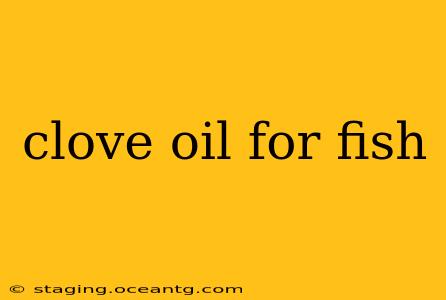Clove Oil for Fish: A Comprehensive Guide
Clove oil, derived from the dried flower buds of the clove tree, possesses potent antimicrobial and anesthetic properties. While its use in human and animal medicine is established, its application to fish raises important considerations. This comprehensive guide explores the use of clove oil for fish, addressing common questions and concerns.
Is clove oil safe for fish?
The safety of clove oil for fish depends heavily on concentration, exposure time, and the fish species. In high concentrations or prolonged exposure, clove oil can be toxic. It's crucial to understand that clove oil is not a "cure-all" and should only be used under specific circumstances and with extreme caution. Always prioritize the least invasive methods first. Improper use can lead to significant stress and even death.
What are the uses of clove oil for fish?
Clove oil is primarily used for its anesthetic properties in fish. This is particularly helpful during procedures requiring temporary immobilization, such as transportation, surgery, or handling. Its antimicrobial properties might also offer some benefit in treating minor bacterial infections, though this is less common and should be done under the guidance of an aquatic veterinarian.
How is clove oil used for fish?
The application of clove oil involves creating a diluted solution in water. The concentration is critical and should be carefully calculated based on the fish species, size, and the specific procedure. Improper dilution can lead to serious harm or death. There is no one-size-fits-all concentration; the correct dosage requires professional expertise or thorough research based on the specific species. Moreover, close observation of the fish is essential throughout the procedure.
What are the potential risks of using clove oil for fish?
The risks associated with clove oil use include toxicity, which can manifest in various symptoms including lethargy, respiratory distress, and death. The concentration of clove oil plays a significant role in determining the toxicity. Other potential risks involve the potential for environmental contamination if not properly disposed of. Moreover, clove oil's effectiveness can vary across different fish species.
Can clove oil be used to treat diseases in fish?
While clove oil possesses antimicrobial properties, it is not a substitute for proper veterinary treatment of fish diseases. Using clove oil to treat a disease without proper diagnosis can lead to complications and delay appropriate treatment, ultimately harming the fish. Always consult an aquatic veterinarian for diagnosis and treatment of fish diseases.
What are the alternatives to clove oil for fish?
Several alternatives exist for anesthetizing or treating fish, depending on the situation. These options might include other anesthetic agents or treatments specifically designed for fish. Consult an aquatic veterinarian to determine the most appropriate and safe method for your specific circumstances.
How do I dispose of clove oil properly after using it on fish?
Proper disposal of clove oil is essential to prevent environmental contamination. Follow local regulations and guidelines for disposing of hazardous waste. Never pour clove oil down the drain or into the environment.
Disclaimer: This information is for educational purposes only and should not be considered veterinary advice. Always consult a qualified aquatic veterinarian for any health concerns related to your fish. Improper use of clove oil can be harmful or fatal to your fish. Always prioritize the health and well-being of your aquatic pets.
